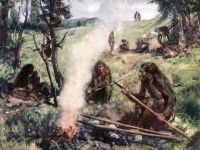Neanderthals drank chamomile, says study
Analysis of teeth tartar fossils showed that the diet of Neanderthals was not strictly carnivorous and included some plants such as chamomile...
An international group of researchers discovered that Neanderthals knew the medicinal and nutritional properties of some plants such as chamomile, and included vegetables in their diet. Researchers arrived at these conclusions from an analysis of plaque present in the fossil teeth of five adult and one young man in the archaeological site of El Sidron, Spain. Until recently it was thought that Neanderthals, who became extinct between 30 thousand and 24 thousand years ago, were strictly carnivorous.
However, more studies like the one published in the German magazine Naturwissenschaften, show that the species also fed on plants, especially in more southern latitudes, said Antonio Rosas, director of paleoanthropology at the National Museum of Natural Sciences and one of the authors. "We notice that, above all in southernmost Europe, like El Sidrón, the Neanderthal had a not insignificant vegetarian component in their diet," he explained.
Researchers found fossil teeth with starch molecules, present in tubers, legumes and nuts. The tartar on the teeth grows by a superposition of layers and between them are stored molecules and chemical compounds. Furthermore, the study found that at least one of the subjects studied had ingested bitter tasting plants, such as Aquilea and chamomile, said Stephen Buckley, from the BioArCh Center, University of York, in a press release.
"The fact that they use this type of plant with little nutritional value is surprising. We know that Neanderthals used them despite being bitter, so they probably selected the plants for reasons that go beyond taste," said Buckley. Antonio Rosas said that after the discovery of the chemical compounds derived from chamomile, it is concluded that the species knew of its medicinal properties.
Karen Hardy, UAB, said that "the variety of plants that we have identified suggests that Neanderthal individuals who lived in El Sidrón had a sophisticated knowledge of the natural environment, which included the ability to select and use certain plants for their nutritional and curative value.
Meat was clearly paramount, but our research shows food far more complex than we knew about so far," said Karen. The presence of plant compounds in the diet of the species is not the only discovery of the work.
According to Rosas, evidence of smoke was found in the tartar, originating, it seems, from foods made with firewood. The archaeological site of El Sidrón, discovered in 1994, has the largest collection of Neanderthals in the Iberian Peninsula.
Translated from the Portguese version by:
Lisa Karpova
Pravda.Ru

Subscribe to Pravda.Ru Telegram channel, Facebook, RSS!


